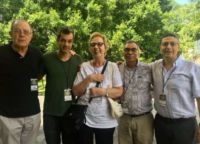
Final Statement
Close to God…Close to the Poor
Inspired by the 50th anniversary of the opening of the II Vatican Council and 40 years of Liberation Theology, we come together in the Continental Conference on Theology at the University of Unisinos, São Leopoldo, RS, Brazil. We wish to share with our churches and people all that we have heard, discussed, lived and celebrated in these few days.
750 people have participated in the conference: young people, adults, lay people, members of religious orders, priests, bishops, and brothers and sisters of other Christian denominations. We have come from all around Latin America, the Caribbean, North America and Europe. We have experienced a true kairos and mobilized the theological community of the continent.
Above all we want to say that we have been strengthened in our hope, a hope that compels us to put our lives at the service of the Kingdom of God. We have prayed, recalling the journey of the church since the beginning of the II Vatican Council and through 40 years of liberation theology. Through workshops and panel discussions we have reflected creatively about important aspects of what it means to be a people of God and how they challenge our theological and pastoral activities.
We have acknowledged and embraced our differences rooted in history, geography, culture, and social and ecclesiastical processes. We are enriched by them, particularly when we celebrate the memory and witness of martyrs who in recent decades have shown extraordinary devotion to the God of Life in our people, especially the poor.
We remember the eminent and beloved Pope John XXIII. We have recalled how he allowed the Catholic Church to learn that in order to be a mother and teacher it must first become a child and disciple. We remember Pope Paul VI who successfully led the Church and people of God with clarity of purpose and courage during the Council and immediately afterwards. Mons. José M. Pires, now 94 years old, gave an emotional account, as a Father who took part in the Council.
We are convinced that we should stay on the path we took at Medellín. We have perceived the new demands of the cultural, social, political, economic, ecological, religious and ecclesiastical context, which today is globalised, despoiled and discriminatory.
We have confirmed that Liberation Theology is alive and continues to inspire the research and commitment of new generations of theologians. Sometimes, however, it is an ember hidden beneath ashes. This congress has breathed on it and rekindled the fire of this theology so it can spread through the Church and society.
Aware that “the Church must examine the signs of the times and interpret them in the light of the Gospel” (Gaudium et Spes 4), we have gone through a collective process of think, feel and act. We have listened to and shared testimonies and experiences, beliefs and viewpoints from our different contexts and now feel compelled to advocate for a today that has a tomorrow.
Times have changed. We have had to pause and open up Latin American Theology to the circumstances and knowledge that have emerged since the time of Vatican II and the birth of Liberation Theology. We hear different voices clamouring: those of migrants, women, original peoples and afro-descendants, current generations and all the newly visible faces of exclusion.
These cries are born of the suffering of those who are deprived of a life of dignity, “living well” (Sumakausai), as God would wish for them, and we seek to join our voices with theirs.
We believe this congress marks the start of a new stage. Something new is emerging and we are increasingly aware (Is 43:19). We want a future with faith, fertility, creativity and joy. Our theological reflections must address the new challenges informed by the Word of God, under the guidance of the Holy Spirit and in deep communion with the poor, who we consider to be Jesus’ priority. So it is that “Everything having to do with Christ has to do with the poor, and everything connected to the poor cries out to Jesus Christ:” (Aparecida Concluding Document, 393).
During the congress we looked far ahead into the future; we are filled with dreams and want to make them reality. One of the most important is to encourage young theologians to inherit the legacy of the first generation of Liberation Theologians. Gustavo Gutierrez spoke of this heritage with emotion as he reminded young theologians that they should be rigorous and profound in their research, involved with the people, and that they should dedicate their lives to the poor. With his phrase “close to God, close to the poor” he reminded all of us present of the best qualities of Latin American theology, and encapsulated the best of the conference.
Now we return to our church communities, ready to take on the tasks of Latin American theology today and to bear witness through our actions that another theology is possible and is a way of making another world possible. This will happen if our young people have vision and our old people have dreams (Joel 3, 1-2)




Leave A Comment
You must be logged in to post a comment.